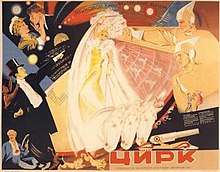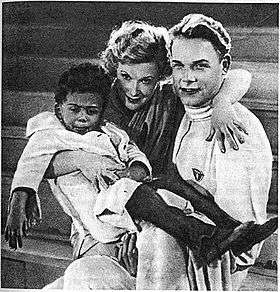Circus (1936 film)
| Circus | |
|---|---|
 Film poster | |
| Directed by |
Grigori Aleksandrov Isidor Simkov |
| Written by | Grigori Aleksandrov |
| Starring |
Lyubov Orlova Vladimir Volodin Sergei Stolyarov Pavel Massalsky James Patterson |
| Music by | Isaak Dunayevsky |
| Cinematography |
Vladimir Nilsky Boris Petrov |
Production company | |
Release date | 1936 |
Running time | 94 min. |
| Country | Soviet Union |
| Language | Russian |
Circus (Russian: Цирк; translit. Tsirk) is a 1936 Soviet melodramatic comedy musical film. It was directed by Grigori Aleksandrov and Isidor Simkov at the Mosfilm studios. In his own words, it was conceived as "an eccentric comedy...a real side splitter."[1]
Starring the glamorous and immensely popular Lyubov Orlova (Aleksandrov's wife), the first recognized star of Soviet cinema and a gifted singer, the film contains several songs which instantly became Soviet classics. The most famous is the "Song of the Motherland" (Широка страна моя родная).[1][2]
The film was based on a comedy written by Ilf and Petrov and Valentin Kataev and performed by Moscow music hall, Under the Circus Dome (Под куполом цирка), which was seen and liked by Aleksandrov.[1] They made the play into the plot, but during the initial film shooting they went to America. Upon return, they disliked the director's interpretation, and after a conflict they abandoned the work, forbade the mention of their names in the credits, and further work on the plot was continued by Isaac Babel.[3][4]
Plot

Orlova plays an American circus artist who, after giving birth to a black baby (played by James Lloydovich Patterson), immediately becomes a victim of racism and is forced to stay in the circus, but finds refuge, love and happiness in the USSR. Her black son is embraced by friendly Soviet people. The movie climaxes with a lullaby being sung to the baby by representatives of various Soviet ethnicities taking turns.[1]
The film was digitally colorized in 2011 in Russia.
Cast
- Lyubov Orlova as Marion Dixon, American actress and circus artist.[5] Her name is a tribute to the actress Marlene Dietrich.[6]
- James Patterson as Jimmy, Marion's baby
- Sergei Stolyarov as Ivan Petrovich Martinov, Soviet performance director
- Pavel Massalsky as Franz von Kneishitz, corrupt theatrical agent
- Vladimir Volodin as Ludvig, Soviet circus director
- Yevgeniya Melnikova as Rayechka, the director's daughter
- Aleksandr Komissarov as Skameikin
- Nikolai Otto as Charlie Chaplin
- Solomon Mikhoels as Cameo
Interesting facts
- In early 1953, the verses from the lullaby, sung in Yiddish (which were performed by Solomon Mikhoels) were removed. After Stalin's death the verses were restored.
- The well known animal trainer Boris Eder substituted for Aleksandr Komissarov in Skameikin's flower fight with the lions.[1]
- The "Flight to the Moon" stunt coordinated and performed by three Kharkiv inventors where the extreme sports athlete Vera Buslaeva substituted for Lyubov Orlova for the cameras.[1]
See also
References
- 1 2 3 4 5 6 Rimgaila Salys (2009). The Musical Comedy Films of Grigorii Aleksandrov: Laughing Matters. Intellect Books. pp. 121–197. ISBN 978-1-841-50282-3.
- ↑ Roger Manvell, ed. (1949). Experiment in the Film. The Grey Walls Press Ltd. p. 169.
- ↑ "Пять интересных фактов о легендарном фильме "Цирк", May 25, 2013 (retrieved July 19, 2015)
- ↑ Сайт поклонников творчества Ильи Ильфа и Евгения Петрова
- ↑ Театральная энциклопедия. / Гл. ред. П. А. Марков. Т. 4. — Moscow: Советская энциклопедия, Нежин — Сярев, 1965, 1152 стб. с илл., 6 л. илл.
- ↑ «Цирк» зажигает огни
External links
- Цирк / Circus on YouTube in black and white.
- Circus on IMDb
- Circus at AllMovie
- Site-museum of Lyubov Orlova Orlova
- Yuri Nikulin on the film Circus